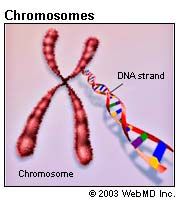Researchers do not know the exact cause of Alzheimer’s disease, but it is most likely due to a combination of a variety of genetic and other factors. Genetic research is concentrating on the role of heredity — the transmission of qualities and illnesses from parents to children — in determining risk for, and development of, Alzheimer’s disease.

How Does Heredity Work?
Every healthy person has 46 chromosomes in 23 pairs. Usually, people receive one chromosome in each pair from each parent. In each chromosome, DNA forms two long, intertwined, thread-like strands that carry inherited information in the form of genes.
Genes are the basic units of heredity that can direct almost every aspect of the construction, operation, and repair of living organisms. Each gene is a set of chemical instructions that tells a cell how to make one of the many unique proteins in the body.
Is Alzheimer’s Disease Hereditary?
Genetic research has turned up evidence of a link between Alzheimer’s disease and genes on four chromosomes, labeled numerically as 1, 14, 19, and 21.
The APOE gene on chromosome 19 has been linked to late-onset Alzheimer’s disease, which is the most common form of the disease. Dozens of studies around the world have confirmed that inheritance of one particular variant of the APOEgene, termed APOE4, increases the lifetime risk of developing Alzheimer’s disease.
One of the puzzles surrounding APOE is why some people with the APOE4 variant do not develop Alzheimer’s disease and why, conversely, many people develop the disease even though they have not inherited APOE4 . APOE, in other words, although clearly influencing the risk of developing Alzheimer’s, is not a consistent genetic marker for the disease.
What Is the Role of Genetics in Familial Alzheimer’s Disease?
Alzheimer’s disease strikes early and fairly often in certain families, often enough to be singled out as a separate form of the disease and given a label: early-onset familial Alzheimer’s disease, or FAD. Combing through the DNA of these families, researchers have found an abnormality in one gene on chromosome 21 that is common to a few of the families. And they have linked a much larger proportion of early-onset families to recently identified and related genes on chromosomes 1 and 14.
The chromosome 21 gene also intrigues Alzheimer’s researchers because of its role in Down syndrome. People with Down syndrome have an extra copy of chromosome 21 and, as they grow older, usually develop abnormalities in the brain like those found in Alzheimer’s disease, though often at a younger age.
Few researchers think that the search for Alzheimer’s genes is over. Most investigators are convinced that there are many more genes involved in Alzheimer’s disease and, moreover, that other conditions must also be present for the disease to develop. One of these conditions may be a problem with the way in which nerves turn sugar, or glucose, into energy, a process known as glucose metabolism.
WebMD Medical Reference


You must log in to post a comment.